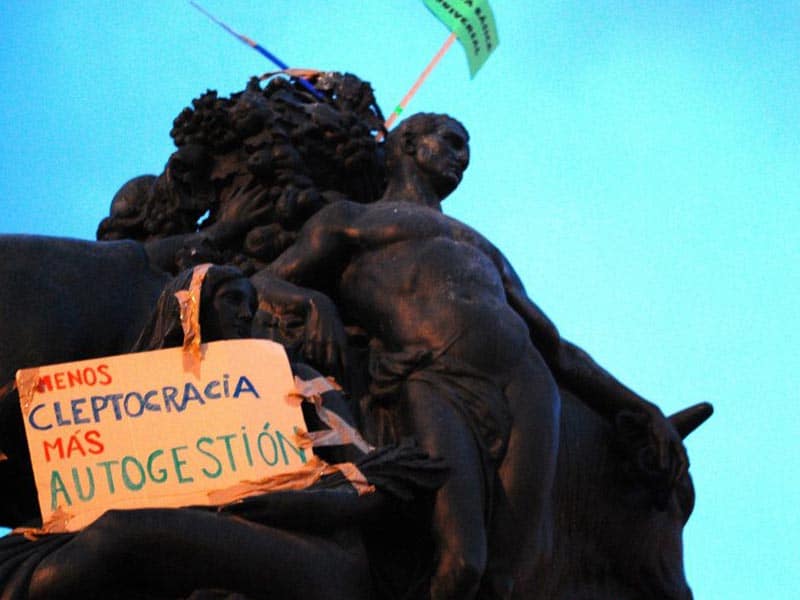A New Millennium (2000 - 2016)
Laia Otero discusses Barcelona’s attitude toward sexual and gender equality.
I think people living in Barcelona, and part of a community…we’re quite privileged. Barcelona is a very open-minded city, a city where very few homophobic assaults occur. We can live quite comfortably, let’s say, in our city. I’ve never experienced an assault, personally. My friends… Well, I’ve never experienced physical abuse. Verbal, yes. I’ve been taunted in the street before. But I turn around, tell them to piss off, and I’m fine. So, in that sense, I see us as living in a very open-minded city, There isn’t an intolerance with the myriad sexual orientations represented here. We must keep moving forward, dispel this binary conception of gender that persists, and is, little by little, But I don’t think it’s the same in small towns. Many people in Barcelona come from small towns throughout Catalonia and Spain. This is all true of Madrid as well. They flee these small towns. Being homosexual, bisexual, intergender, transgender, queer… It’s different in those small towns than in big cities. There’s still a lot of work to do, but it is true that, at a legal level, under the Socialist Party During the first four years of legislature, they did many things right, among them, legalization of homosexual marriage. And, although I’m not a big fan of marriage, I think it’s a tool that’s allowed homosexual, bisexual, transgender people to achieve normalcy… I don’t like the term ‘normalcy,’ but, well, to be afforded social acceptance. But when you consider that the dictatorship didn’t end so long ago, and that the Vagrancy Act existed, which made homosexuality a jailable offense, there has been great progress.
José Grech Oliver explains why the small Barcelona shop is a thing of the past.
That’s easy to understand. For example, I went to a local shop for a tie. They had four, and they were all expensive. So if I go to Corte Inglés, or to a big store, there are 20 options, all cheaper, because they buy in bulk, making it profitable for them. That’s why the little shops are vanishing. Big companies buy wholesale and have a wider selection. Have you observed a change in the essence of Barcelona? Well, of course. Big companies haven’t always existed. The Corte Inglés, the Alcampo, the Maquinista, all of them arrived here later. And now we see how the little shops don’t work. Not like they did years ago. Back then, they did work, but that’s changed, so they’re disappearing.
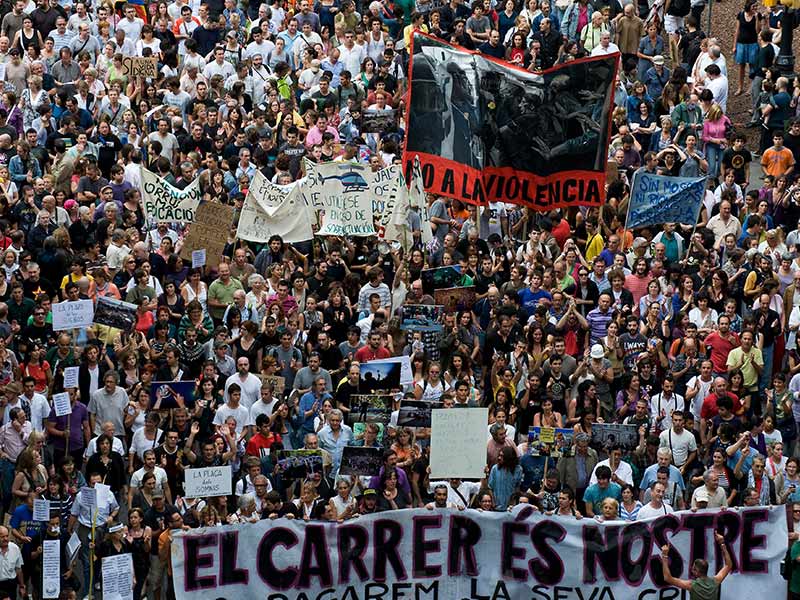
2011 – Anti-austerity protest in Barcelona.
Alberto Artigas discusses the state of television in Spain.Television here in Spain is, for my taste, kind of a joke. There’s TV1 and TV2, national networks under the same umbrella. And there are the newer ones: Antena 3, Telecinco, Cuatro and La Sexta. TV1 supports the government. If the government says, “Go that way,” it says, “Go this way,” and vice versa. For example, the PP is currently in charge. And I’ve heard, so I’m not sure, but I’ve heard that there is a TV series about the Republic, but they were told not to release it, and acted accordingly. Antenna 3 has always been a bit more right wing and conservative. And Telecinco, it’s reality TV shows, gossip shows, Sálvame, all these things, which don’t do anything, and exist simply for people to watch them, to watch them so they can feel like they’re doing something, when, actually, they’re just filling a void with the great lives of all these minor celebrities. After that, there’s Cuatro and La Sexta which are a little bit newer. Cuatro was of a little higher quality, but when the Telecinco group bought it, it went… The moment when Iñaki Gabilondo left and was no longer presenting the news, it began its decline. Now it’s identical to Telecinco. All the shows they can’t put on Telecinco end up on Cuatro. And La Sexta, the more progressive, left wing channel, was purchased by the group behind Antena 3. And while this group is interested in having the left-wing audience share of the market, they also made it less left-wing. It’s not in their political interest, but keeping it a bit progressive retains the audience. Then, there’s Catalan TV, mainly TV3, Super 3 and 324, which is 24-hour news. It’s, more or less, the same situation. It belongs to the government, and they do as the government says. As the government is setting a pro-independence agenda, so does TV3. And I think it’s all the same, because, in the end, television here in Spain… even the government’s public television is not here to create cultural nor quality content. Their focus is on achieving economic or political goals. An example of this is TV2, which broadcasts mass every morning, but wouldn’t show the Pride Parade because “the public wasn’t interested in the event.” The fact that in a secular state, mass is considered to be in public interest, but a parade heralding the rights of a minority is not, Well, it is like that, and I think that illustrates the shape of television here.
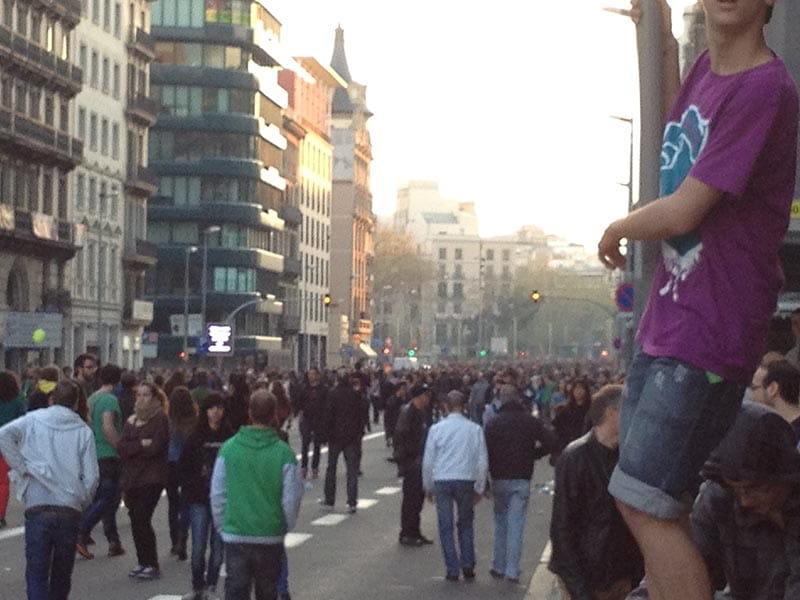
2011 – Protesting austerity measures in Barcelona.
Jordi Peñarroja and Jenny Beacraft explain why Barcelona looks so unique. What changed was that, during the Exposition, Modernism began. The 1888 Barcelona Exposition got underway on May 20th, with 30 countries participating. The city’s greatest architects, men like Lluís Domènech i Montaner, and Josep Vilaseca i Casanovas, ensured that the trip would leave an indelible mark on every attendee. Montaner’s Castle of the Three Dragons stands as the earliest example of Catalan Modernism, an art and architectural tradition unique to Catalunya, that distills elements of the English Arts & Crafts movement, and the Gothic Revival, and is seen as being associated with the search for Catalan identity. Modernist buildings share a proclivity for curve over line, seeking to connect the modern city landscape with the natural world. Between 1888 and 1910, the style was adopted by architects and craftsmen like Josep Puig i Cadafalch, Josep Maria Jujol i Gibert, as well as Enric Sagnier i Villavecchia, the great builder for the city’s bourgeoisie. To this day, the most recognizable modernist is Antoni Gaudí i Cornet, but collectively, these architects, in articulating the speculative real estate ventures of the city’s upper crust, are the reason Barcelona looks like no other place on earth.
Financial Lawyer Erika Rubio discusses Spain’s controversial “Golden Visa.”The golden Visa is a foreigner who comes here, buys a house for half a million euros and has a residence and work permit. What does this cause? Many people said, well, I have a flat worth 400, but who says it can’t be worth 500? I take one of the typical, Chinese, Russian, Japanese, they come here and you say, those can’t even compare, they just know that they have to spend 500.000 euros. What effect that has on the rest of us? Flats that were worth 300.000 or 350.000 suddenly are worth 500.000. That has made access to housing very hard for the people who live in Barcelona. You need to leave, it will be the same as in big cities. The center will be a place where you can’t live in the city.
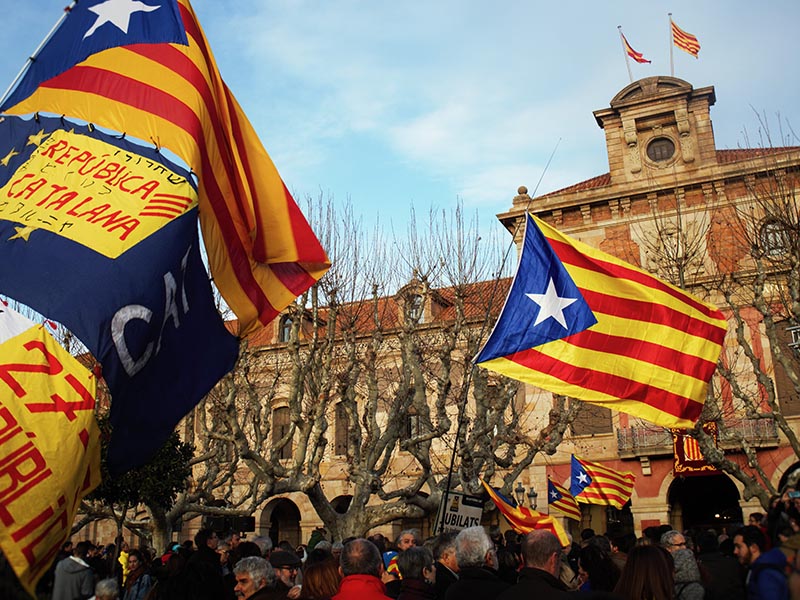
2016 – Demonstration in front of the Catalan Parliament building in Barcelona.
Meritxell Campmany discusses how Barcelona survives high unemployment. I believe we’re a country of networks centered around family. I also think the black market economy remains of the utmost importance. With the unemployment figures, there’s no credible reason…we’re not experiencing great social unrest, nor numerous deaths from hunger. So the convergence of family networks and the welfare state…help people get by with little. Deception endures, so if you can avoid declaring income, you do. I think that explains how people survive these unemployment rates. Otherwise, there would be social revolution.
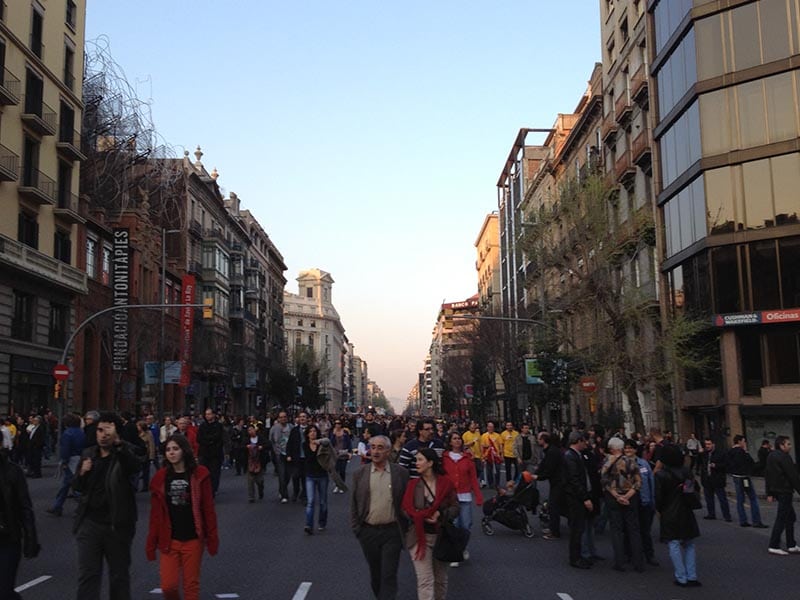
2011 – Protesters march down Carrer d’Arago in Barcelona.
Helena Ruiz cites a few differences between Barcelona and the rest of Spain. What differences do I see between Barcelona and the rest of Spain? There are many and at the same time there aren’t. I mean, it’s still Spain but I do find… For example, in Barcelona there are citizens from all parts of the world. Many more than in the rest of Spain. That makes that the average Catalan is much more tolerant to those that are different, That have another culture, another nationality. That have another ideology. And this doesn’t happen in the rest of Spain. I’ve been rejected for being Catalan by young children who didn’t even know why they were rejecting me. Which here in Catalonia, as a kid, had never happened to me, that I was discriminated for dressing differently. I got lost. Not, it’s okay. Then… Well, then, besides the differences regarding that here there’s more tolerance than in the rest of Spain, there’s also the side that it is difficult to enter a group of Catalan friends. I mean, on one side there’s the tolerance, but on the other there’s like a barrier, it’s okay that you’re here but don’t meddle in my world. That have… Catalans in general.
Agustí Molins discusses healthcare in Catalonia. Actually, the health system in Catalonia is a model that is being followed in many other countries because it is a successful model, a model that cares for all. And, specially, it’s has done a very important work in research and investigation for many years. That has made that from our education have arisen world-level top tens. I can think now, after a former generation like doctor Dexeus, doctor Barraquer, who are world institutions. Suddenly, we now still have doctor Baselga, who is world pineer in treatment of cancer and research on cancer treatment. Doctor Massagué. The current health system is in danger. It is in danger because ther have been so many cutbacks that we can’t face. The only way to supplement that is an excess of work from my colleagues working in the public health system. Dedicating many more hours to visit the same amount of patients for the same money.
Estela Fernandez discusses Barcelona’s financial crisis. It’s not that long ago but it is true that a lot of local businesess have had to shut down and a lot of maybe more international convenience stores popped up everywhere. That is true and I think it’s a tendency that has not stopped, unfortunately. I think when the crisis actually began, there was a huge movement that even got so far to the States with the Occupy Movement, which actually started here. Well, actually it started with the… maybe with the Arab Revolts and everything but in Europe, it started here. And I remember going to the demonstrations. There was one, for example, that was like you are never going to have a home of your own. You know, that was one of the mottos, one of the slogans. And I think people were more readily… they were more ready to fight in a way, or to resist the crisis and the consequences of the crisis more than they are now. You know, it’s curious but I think all has just gone down now. People are more tired now. Lots of people went out of business. Some people say that we were coming out of the crisis, getting better financially… I don’t see that but some people say so. But I don’t think so.
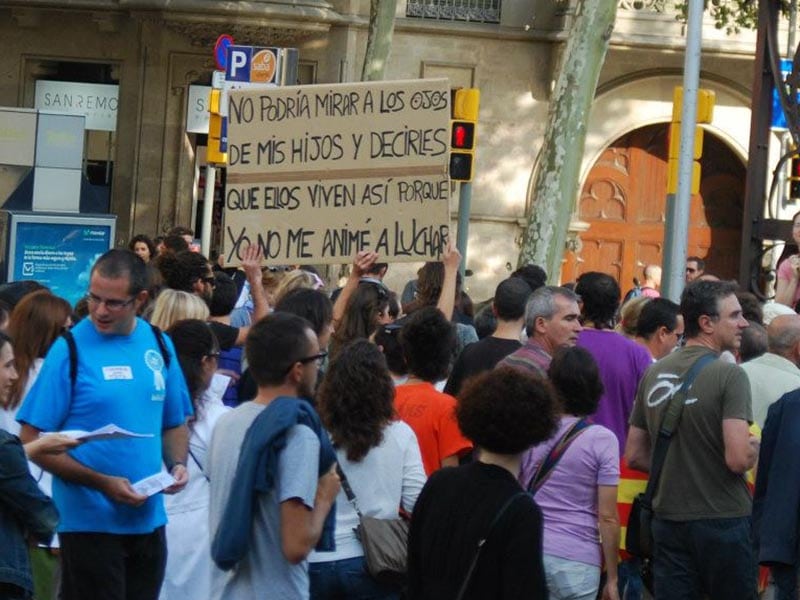
2011 – Members of Take the Square movement in Barcelona.
Jaume Muñoz decodes all those flags in Barcelona windows. When you first come to Barcelona, you can see two flags flying from the windows: The official one is the Coat of arms of Catalonia, which is based on four red pallets on gold background. The unofficial one is the Estelada. It has the same design as the Senyera but with the addition of a five-pointed star in a triangle at the hoist. This flag is flown by Catalan separatists to express their support for an independent Catalonia. Therefore, to know the political position of any family you just need to see the flags that fly on their windows. If you have the Catalan flag, it means that you feel Catalan. If you have the Estelada it means that you are a Catalan separatist. The Spanish one means that in that house, Spanish is the only spoken language.
